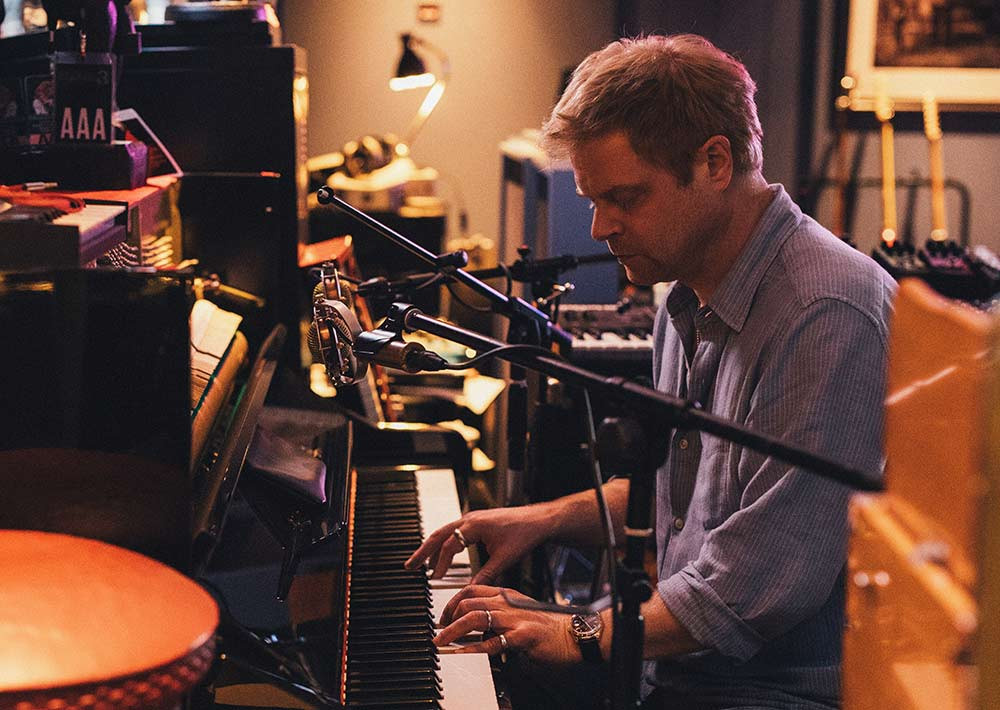Felix Bechtolsheimer, the creative force behind the acclaimed cosmic alt-rock band Curse Of Lono, has a knack for transforming personal experiences into compelling music. Their 2021 album, People In Cars, stands as a testament to this, navigating themes of loss and resilience with a captivating blend of darkness and hope. Among the album’s standout tracks, “Think I’m Alright Now” emerges as a particularly poignant and hypnotic exploration of emotional recovery and the weight of personal tragedy. This song deconstruction delves into the heart of “Think I’m Alright Now,” uncovering the inspirations, lyrical depth, musical intricacies, and studio craftsmanship that make it a resonant piece within Curse Of Lono’s discography and a notable example of modern songwriting.
The Genesis of “Alright Now Song”: Inspiration from Sleepless Nights and Emotional Swamps
Bechtolsheimer’s songwriting process is anything but conventional. He describes a unique method of creation, keeping lyrical ideas and musical fragments separate until the inception of a new album. This separation leads to a period of intense creativity, a “sleepless nights” phase where he pieces together disparate elements, like assembling a Frankensteinian creation from “two unrelated swamps.” For “Think I’m Alright Now,” the journey began with a guitar riff, a melodic seed that lingered for months. Despite its initial allure, a compatible vocal melody remained elusive. However, as Bechtolsheimer continued to revisit the riff during his musical explorations, a melody unexpectedly surfaced. Capturing this spontaneous moment on a voice recorder, the first lines of the song were born, hinting at the emotional landscape the track would eventually inhabit. This organic, almost accidental, beginning underscores the often-unpredictable nature of songwriting inspiration.
 Curse Of Lono
Curse Of Lono
Lyrical Catharsis: From Personal Apology to Universal Lament in “Think I’m Alright Now”
The lyrical foundation of “Think I’m Alright Now” was initially rooted in personal introspection. Emerging from a period of depression, Bechtolsheimer grappled with conflicting emotions: the relief of recovery juxtaposed with feelings of shame and inadequacy. This internal conflict led to lyrics that began as “almost an apology” to his wife, acknowledging the challenges of living with someone battling depression. However, life took a devastating turn. The loss of his father, uncle, and ex-girlfriend in quick succession during the pandemic profoundly reshaped the song’s meaning. This confluence of personal grief and global uncertainty broadened the song’s scope, transforming it from a specific apology into a more universal expression of pain and resilience. As Bechtolsheimer refined the lyrics, they evolved into a poignant blend of personal narrative and shared human experience, capturing a feeling anchored by scenes from his life yet resonating with wider audiences. The “Alright Now Song” became an anthem of navigating profound loss and finding a path forward.
Musical Tapestry: Weaving Influences from The Stone Roses to Yo La Tengo
Musically, “Think I’m Alright Now” is a rich tapestry of influences, reflecting Bechtolsheimer’s eclectic tastes. He envisioned a sonic meeting point between The Stone Roses, Wilco, and Yo La Tengo, aiming for a blend of rhythmic drive, Americana-infused textures, and experimental soundscapes. While the final result may have diverged from this initial vision, the attempt itself yielded something uniquely compelling. Neil Findlay’s drums provided the rhythmic backbone, grounding the song with a “perfect beat.” Joe Hazell’s guitar work is highlighted as a standout element, described as a “meandering musical commentary” that enhances the lyrical narrative, at times surpassing the expressiveness of the words themselves. Charis Anderson’s bassline offers a steady anchor, keeping the rhythmic elements in check, while Dani Ruiz Hernandez’s keyboards and Joe Harvey Whyte’s pedal steel guitar combine to create a deep, atmospheric sonic backdrop. Layered four-part harmonies add a final touch, lending a luminous quality to the song’s overall sonic texture. This intricate musical arrangement elevates “Think I’m Alright Now” beyond a simple rock song, transforming it into an immersive sonic experience.
 Curse Of Lono
Curse Of Lono
Studio Innovation: Recording “Alright Now Song” in the Age of Covid
The recording process for “Think I’m Alright Now” was significantly shaped by the constraints of the Covid-19 pandemic. For a band accustomed to the energy of live, simultaneous recording, the pandemic necessitated a completely different approach. The band opted for a “back to front” recording method. Bechtolsheimer began by laying down his guitar part and a guide vocal track over midi parts created by producer Oli Bayston. Subsequently, each band member recorded their individual parts separately – drums, bass, keys, guitar, and pedal steel – with only Bechtolsheimer and Bayston present throughout the entire process. The backing vocals marked the only instance where a larger group convened in the studio, gathering at The Pool Studio. This fragmented recording process, while “disorienting” for a band rooted in live performance, ultimately proved successful under Bayston’s guidance. The final track, despite its unconventional creation, is a testament to the band’s adaptability and the producer’s skill in weaving together disparate elements into a cohesive whole. The story of recording “Think I’m Alright Now” illustrates the innovative approaches artists adopted to overcome the challenges of creating music during unprecedented times.
Final Reflections: Embracing Stream of Consciousness and Trusting Intuition
“Think I’m Alright Now” is described as a “strange beast,” born from a period of creative inertia and emotional weight. The extended gestation period, where musical and lyrical fragments “hung around for many months,” allowed for a process of percolation and maturation. This extended timeframe proved beneficial, ultimately shaping the song into a more nuanced and resonant piece. Bechtolsheimer emphasizes the valuable lesson learned from this song and the album as a whole: the importance of relinquishing excessive control and “not to think too much about what I’m trying to do or say.” He highlights the power of stream-of-consciousness writing and trusting intuitive melodic ideas. While editing and quality control remain essential, he acknowledges that “the good stuff usually comes when I’ve stopped trying.” This insight into Bechtolsheimer’s creative philosophy provides valuable perspective for aspiring songwriters and artists, emphasizing the significance of embracing spontaneity and trusting the subconscious in the creative process. “Alright now song”, in its final form, stands as a powerful example of this approach, a song born from personal experience, shaped by unforeseen circumstances, and ultimately transcending its origins to connect with listeners on a deeply emotional level.

